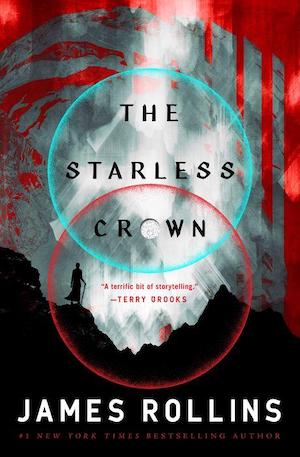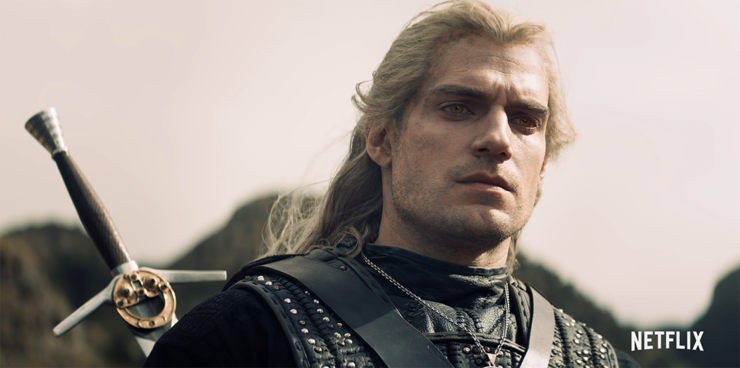Two quick things: first, this is not a recap of season one of The Witcher. If you’re in need of a refresher before Friday’s season two premiere, Netflix made you a very helpful video that gets the job done in a cool 6.5 minutes. Second: I have not read the books, nor have I played the game, nor do I plan on doing either of those two things. For the purpose of my coverage of this show, I am simply a beautiful idiot with no preconceptions about these characters or this story.
Much has been written about the way showrunner Lauren Schmidt Hissrich’s initial season handled the respective timelines of our introductions to Geralt of Rivia, Princess Cirilla of Cintra, and Yennefer of Vengerberg, whose backstories cover anywhere from two weeks to seven decades or so. On my initial viewing in 2019, I have to admit, I… just didn’t pay that much attention to the timelines. Call it PGOTSD (Post Game of Thrones Skeptic Disorder), but with The Witcher coming a scant six months after the end of the HBO mega-hit, I had a hard time getting myself to invest much mental energy in the logistics of another sweeping fantasy series. That’s not to say I don’t understand the impulse to try to keep track of everything—the amount of energy I wasted yelling about how Benioff and Weiss fumbled the bag vis-à-vis internal consistency in Game of Thrones… well, the less said about that the better. But ultimately where I land on this is: it’s epic fantasy. It’s not that deep. Rapid travel around Westeros or the Continent or wherever happens when the narrative needs it to, and time passes much in the manner of a broken accordion: goofily.
As someone who has a tough time with faces and names even in my day-to-day life (if we’ve ever worked together or met through mutual friends, I am genuinely sorry for the 3-5 times I’ve reintroduced myself to you; it’s not you, it’s my horrible brain), my approach to the expansive cast of season one in general was “let go and let Geralt.” I recognized the three main characters, and that was just gonna have to be enough. Whatever happened beyond that, well, I was along for the ride with an open heart and a smooth, smooth brain. I was there for fight scenes and monsters and Jaskier’s comic timing and Yennefer’s Ren Faire-by-Hot Topic costumes, and, of course, for Henry Cavill in a bathtub and/or bringing refreshments to an orgy.
But a funny thing happened to me upon rewatch: I found myself fascinated by the season’s storytelling mechanics, which had largely washed over me the first time. And you know what? I think the puzzle-box approach Hissrich and her team used here works better than the viewing audience (myself included) largely gave it credit for. Once you’ve caught onto the fact that mentions of Queen Calanthe and Cintra are the Rosetta Stone to the whole narrative, it’s actually fun to watch the way the writers have structured how the story unfolds—in S1E7, for example, the new information we get about Geralt’s proximity to Ciri during Nilfgaard’s siege of Cintra gives their series of near misses a whole new emotional weight.
Buy the Book


The Starless Crown
It’s easy to say this in hindsight, of course, but it’s honestly tough for me to imagine an approach to tying these three origin stories together that would’ve been satisfying to existing fans and new viewers alike without collapsing under the weight of its own logistics. Hissrich’s approach was a gambit, certainly, and one that paid off… moderately well, given that the timeline confusion was widespread enough to become a punchline but the show was still a massive success in spite of it. But I deeply appreciate the ambition required to swing for the fences like that, even if it wasn’t quite a home run—I’d pretty much always rather watch an inspired idea messily executed than the safe option done perfectly. Early reports suggest that season 2 adheres to a much more linear storytelling style, and that’s unquestionably better for the casual viewer (not to mention the casual reviewer), but I’m glad they went big and weird right off the bat.
I also had a new appreciation for the show’s tone on this viewing—if Game of Thrones represents the Takes Itself Seriously as a Heart Attack end of the spectrum and Xena: Warrior Princess represents the opposite pole of High Camp, The Witcher lands squarely in the middle, executing what I suspect is a very difficult balance between “has engaging plotlines and emotional stakes” and “is still really fun to watch.” To wit: Jaskier is the show’s main audience stand-in and comic relief, and Joey Batey is a talented comedic actor (the first season episode where Jaskier is under the djinn’s curse and can barely speak affords Batey the opportunity for some truly great physical comedy), but he has heart, too, and a certain vulnerability. And the show doesn’t reserve levity just for Jaskier—Geralt is funny, and so is Yen, in her own deeply angry way.
The main and supporting characters here are generally pretty nuanced—most fall into some kind of moral grey area, but the show is never a slog. Themes of fate and free choice are woven throughout, but treated with a light enough hand that you don’t feel like you’re being made to eat your vegetables. And, possibly most importantly, the show also recognizes that it’s just great fun to watch Geralt get his shit rocked by monsters (and vice versa).
Here’s what I want out of this season:
- More Nilfgaard! More Fringilla! I’m dying to find out more about Nilfgaard’s religious zealotry and plans for world domination. What’s the White Flame? What’s Cahir’s whole [gestures vaguely] deal? Luckily, interviews with Hissrich (and the season two trailer) suggest that this is almost certainly coming our way.
- Yennefer’s endless quest for power and love (and her inability to meaningfully distinguish between the two) was, for me, one of the most compelling storylines of the first season—I assume getting her ensconced with Geralt and Ciri will be one of the main arcs of this season, but I’m really looking forward to her continued emotional growth.
- Speaking of our main trio, I look forward to three real “fuck it, I’ll do the whole group project myself”-ass characters learning to work together and trust each other.
- As someone with a deep and abiding appreciation of goofy fantasy names, I am forever grateful to The Witcher for giving me Mousesack, Fringilla, the Wraiths of Mörhogg, and, of course, the silly name GOAT, Vilgefortz of Roggeveen, so I’m eager to see what absolute knee-slappers we get this season.
- Henry Cavill’s commitment to the character continues to be the anchor of this show for me, from his magnetic screen presence in fight scenes to his dry humor and Roy Kent-like “I’ll do it, but I’m gonna complain the whole time” put-upon-ness. (NB to the universe: a just and loving god would give me a video of Henry Cavill and Brett Goldstein having a glower-off. My spiritual DMs are open.) Cavill’s a talented performer and the more opportunities he gets to exercise his chops, the better.
- And Rachel Ashcroft, who knows much more about the book series than I do, has a great piece on what she hopes to see in season two here.
Tune in this Friday, December 17, for The Witcher’s season two premiere, and then join me back here for thoughts, discussion, and bad jokes.
Emily Hughes wants to talk to you about scary books. As the site editor for TorNightfire.com, she’s dedicated to bringing the good word about horror to the masses. You can find her writing at Tor.com, Electric Lit, Thrillist, and Brooklyn Magazine. Formerly the editor of Unbound Worlds, she now writes an occasional newsletter about horror fiction and tweets bad puns @emilyhughes.











I’d just like to add my own hopes that we’ll get another excellent soundtrack out of this coming season – I’m listening to the first season soundtrack even as we speak and even the bits that aren’t Dandelion’s greatest gift to the fandom are really, really good.
Also, it should be fun to see if Season 2 carries Geralt to new heights of Grumpy Dad Cavill …
This was a great warm up article for the new season. Thanks!
I really liked the decision to split the three characters in we are following them at different times. Because it makes their meeting and all being in the same places more exciting, and because it makes the whole world seem larger or more lived in. They have history. We got to see it rippling forward. I’m hoping for season 2, they still break a heavy plot with a shift of some sort. Either one shot hunts or side stories or flashbacks.
I’m binging the first season, so that I can start the second season with all the stuff in my head.
And in my re-watch, knowing what I know about the timeline, it totally works for me. And yes, I too am ready for more bathtub scenes.
Is it wrong that instead of singing carols, I’m still humming “Toss a Coin to Your Witcher”? That’s totally normal for this time of year, right?